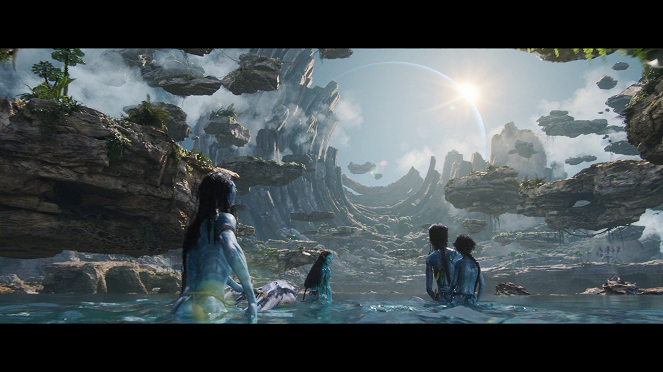Directed by:
James CameronCinematography:
Russell CarpenterComposer:
Simon FranglenCast:
Sam Worthington, Zoe Saldana, Sigourney Weaver, Stephen Lang, Kate Winslet, Cliff Curtis, Joel David Moore, CCH Pounder, Edie Falco, Brendan Cowell (more)VOD (6)
Plots(1)
Set more than a decade after the events of the first film, Avatar: The Way of Water begins to tell the story of the Sully family (Jake, Neytiri, and their kids), the trouble that follows them, the lengths they go to keep each other safe, the battles they fight to stay alive, and the tragedies they endure. (20th Century Studios)
Videos (12)
Reviews (11)
What is the recipe for the success of Cameron’s films? As in the case of Pixar’s top projects and all of Hayao Miyazaki’s movies, there is no secret to it; on the contrary, it is banally uncomplicated, though not simple or obvious. Cameron creates fantasy worlds with the ambition to maximise the viewers’ immersion in them and he achieves this by being absolutely demanding and making no comprises. Cameron’s essential asset as a master director is his complete understanding of the technological possibilities of the medium and his ability to push those possibilities in a visionary way. But what receives little emphasis is the fact that Cameron subordinates to this immersion not only the demands of executing the special effects, but primarily his formalistic signature. He doesn’t create money shots, fool around with the camerawork or editing, show off with flashy long shots or otherwise let the film exhibit itself to the audience. When he goes for a slow-motion shot, he does so in the interest of working with the dynamics and build-up of the whole sequence, not with the aim of making a cool picture. That doesn’t mean that he doesn’t set challenges for himself. His films contain a lot of difficult shots and each of his projects is actually a major campaign with the objective of conquering new territory for cinema as a medium of illusion. But, again, all efforts remain subordinate to the audience’s immersion in the given world he has created. This maxim also guarantees that the narrative isn’t cluttered with anything that would break the fourth wall, whether references nodding at fans or characters and artefacts that serve only as intrusive advertisements for associated merch. Unlike Star Wars and the Marvel movies, Cameron’s films don’t offer corporate-calculated webs of stories that would lend themselves to fandom fetishisation. Instead, Cameron simply creates fictional worlds that entice viewers with their fantastical nature and the promise of their settings and characters. Cameron himself says that his screenwriting process comes from two directions. On the one hand, there are the characters and their relationships. On the other hand, there are the specific scenes and settings that Cameron would like to see. Writing the screenplay then involves coming up with motivations and peripeteias that connect these two pillars causally and logically. Then, of course, there is Cameron’s own imagination, which shapes the particular worlds. And that’s all; there is nothing else behind his success (well, except for effective PR, which in turn relies on the potential that Cameron creates). It then invites further reflection on what it says about the state of blockbusters and Hollywood as a whole when the above is not the norm but a celebrated anomaly. ______ In light of the above, the only weakness of Cameron’s films is his screenplays. Or perhaps it’s only the perspective of viewers who aren’t completely captivated by them. Compared to the first Avatar, the narrative shifts in the sequel may not sit well with some viewers. Conversely, some will be irritated by the excessive similarity between the two films and the repetition of motifs. Still others will have an issue with the apparent lapses in logic (even if they are transgressions against the opinions of the respective viewers and not against the rules of fiction). Other people won’t be able to get past the wall of their own cynicism and accept the new-age environmental ethos, naïve mythmaking, post-colonial romanticism or Cameron’s characteristic melodrama. Personally, I was saddened mainly by the evoked impression that I had already seen several times. For one thing, Cameron again builds on the first film’s love story with the story of a family on the run and a coming-of-age motif, just as he did with Terminator 2. The story of parental love that turns into anxious criticalness and the necessity of giving adolescents their freedom regardless of what mistakes they make as a result because they can grow only by making those mistakes fortunately remains universal and fundamental enough not to seem derivative. Furthermore, its likable in that it irritates the parents in the audience and appeals greatly to younger viewers. Apart from that, however, memories of key sequences in Titanic and The Abyss inevitably creep into one’s mind at particular moments in the film. On the other hand, the idea that Cameron is merely ripping himself off can be quickly dispelled by recalling the work of George Miller, who also works with variations on certain motifs in the Mad Max films. Cameron also uses similar situations simply because he likes them, knows their dramatic potential and enjoys recreating them. ______ After all, personal passion and imprinting one’s signature on a film are essential attributes of a director’s work. Cameron most clearly projects into his films his often mentioned fascination with strong women and warrior mothers, as well as his fascination with the undersea world. With respect to the latter, the second Avatar is perhaps his most inward-looking project since The Abyss. In multiple storylines, he expresses the desire to merge with that alien world which is so close, actually within reach, but the limits of the human body constantly make its strangeness and unattainability felt.
()
(less)
(more)
The power of the family bond, the harmony between man and nature, the destruction of ecosystems for the purpose of monetisation. Cameron sends some important messages and quite clear appeals out into the world with Avatar 2, and he succeeds again, of course, and not only that. The new blues represent the visual benchmark of the modern blockbuster, and Cameron once again throws down the gauntlet to other filmmakers, blowing them out of the water for the umpteenth time in his spectacular King of the World career. Compared to the first one, the sequel is a technical evolution. It tweaks little details, upgrades the story setting, adds more imaginary "levels" and works with Stephen Lang's character in an interesting way. The second third is quite slow and the least entertaining, but the lavish and spectacular finale, like in the first, makes up for it. Apart from the technical aspects, there's nothing really groundbreaking or unique, but Cameron, as a lover of the planet, animals and especially the underwater depths, is passionate about his dream project and you can feel that he loves what he's doing and gives it his all, and that can't be said of every hitmaker in Hollywood.
()
Avatar: The Way of Water has the screenwriting of a mediocre television series that’s not in any hurry to get anywhere. Not only can the story again be summed up in a single short sentence, but it’s the same as the last time and it looks like the next one won’t be any different. The unnatural movement of the blue lizards on dry land hasn’t changed since the “pilot”, so the first half of the film comes across like a video-game demo. Transitioning to the world under water is thus a tremendous upgrade. The lizards swim much more elegantly than they walk and jump, and James Cameron breathes extraordinary life into the fictional undersea plants and animals. It is beautiful and enchanting. Luc Besson will be pleased. The human characters are also given space on the water, thus giving the digital artifice a more physical sense of drive. All of those submarines, mecha crabs and wicked scenes of “whale” hunting are uber cool, reminiscent of the action treats in Waterworld. Overall, however, the Avatar phenomenon becomes rather more of an amusement-park attraction (with the promise of a VR future) than a cinematic work in the true sense of the word. It’s kind of like Cameron’s version of a Marvel flick, but with poor character development, which is a bit of a shame.
()
The technical execution is of course perfect, if not more, but I think the first film had a better story because the ecological message suits Avatar a bit better than family values. It's possible that it will work the second time around, because I had a similar experience with the first film, but now it really took me a while to get my bearings on the new characters after the initial rushed "It Happened", and before I accepted, for example, the somewhat B-movie way in which the villain Quaritch and co. return. It’s a shame. Still, Avatar: The Way of Water is definitely a proper big movie that deserves to be seen in the cinema. “Only” that it isn’t perfect.
()
James Cameron once again shows Hollywood who is the king of blockbuster movies. Despite its three-hour running time, Avatar 2 is entertaining from beginning to end, with breathtaking audiovisual and personal stories of old and new heroes at the ideal pace. Pandora is perhaps even more beautiful than last time, the newcomers are likeable, and Cameron keeps the pace from start to finish without a single flinch. And after thirteen years, he shows that he's still a long way ahead of most Hollywood filmmakers.
()
Gallery (78)
Photo © Walt Disney Studios Motion Pictures


